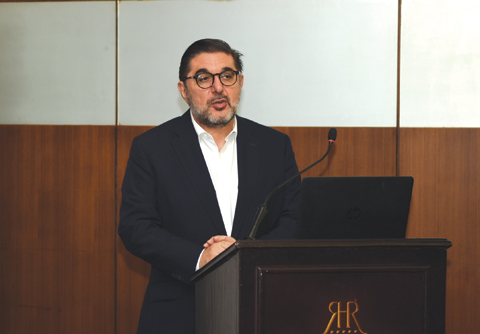 Bruno Strigini, CEO, Novartis Oncology
Bruno Strigini, CEO, Novartis OncologyAMMAN: A gathering of leading medical experts to discuss solutions for transforming cancer care in the Middle East and North Africa was held in Amman recently, organized by the Swiss pharmaceutical giant Novartis. Kuwait Times spoke to Novartis Oncology CEO Bruno Strigini on the progress in cancer research and affordability, and what is being done with researchers, governments and various organizations to make treatment accessible to a majority of patients. "There hasn't been more research in cancer treatment, but there is a lot of innovation in targeted therapies. We are in the beginning of a new era and we believe that it will bring a lot more treatment options. We will continue to progress in our fight against this terrible disease," Strigini said.
"Access varies from country to country, but by large if we look at the region here, we are involved in three types of activities. We have set funds for those who cannot afford it. It also depends on the country where you are, as the degree of affordability may vary. We have programs with some governments, where we are getting into partnerships to access the patients. We make effort and they make effort and we reach a way to work together," he said.
Strigini said that there are programs in those countries where patients pay out of pocket, "where we are going to help through some programs, and there are some countries where we have extensive programs". "We are doing a lot for those who cannot afford treatment. For example, efforts are being made with refugees. We started in Lebanon, and are looking to extend it into other countries as well and see whom we can assist, and help people who do not have any means," he told Kuwait Times
Asked when he expects cancer to be like any other curable disease, he said this is a difficult question to answer. "What is clear is that there has been a lot of progress over the last 15 to 20 years. It started with the advent of targeted therapy, and this revolutionized the field of oncology. Fifteen years ago, when someone was diagnosed with chronic myeloid leukemia (CML), it was a death sentence. But I have personally met some people who have been on the pill for 15 years and lead a normal life. We are making progress and continue to make progress," Strigini said.
The invitation-only media event was titled "Innovating for Patients: Transforming Cancer Care in the Middle East & North Africa". The agenda focused on the rising incidence of cancer in the Middle East, underscoring the future of cancer care along with Novartis' efforts to address unfulfilled patient needs through introduction of clinical trials, cost models and treatments to the regions.
While cancer mortality rates are decreasing in Western countries, they are continuing to rise in developing areas of the world'. Specifically in the Middle East and North African (MENA) region, the incidence of cancer is expected to increase more than in any other part of the world, doubling in the next ten years. Contributing to this rise are factors including the adoption of Western diets and lifestyles, increased prevalence of obesity and young smokers, high prevalence of hepatitis C infection, and pollution.
Crucial during the event was a panel discussion on the existing barriers to delivering innovative medicines to people with cancer in the Middle East, including strategies from Novartis to improve access in the region. With the recent emergence of drugs for more specific patient populations, the panel's dialogue focused on opportunities to widen treatment availability in the MENA region, whether through better communicating patient needs or improving the current regulatory framework. With patient assistance programs bringing treatments globally to those in need, Novartis is determined to offer resources to these parts of the world and support cancer advances for the future.
"Cancer is a major cause of morbidity and mortality in the coming decades in every region of the world, with the number of patients climbing the most dramatically in the Middle East," said Strigini. This event, the first of its kind in Jordan and the region as a whole, is a reflection of the Novartis mission to discover new ways to improve and extend people's lives and our commitment to addressing unmet medical needs in cancer to advance the care of patients"
Medical experts also shared the latest data regarding care and treatments for chronic myeloid leukemia (CML), breast cancer, and thalassemia, all highly prevalent in the MENA region. Breast cancer, for example, has the highest incidence among cancers in the area. Similarly thalassemia, a diverse family of genetic disorders characterized by an underproduction of the oxygen-carrying protein in red blood cells, is most prevalent in people of Mediterranean and Middle Eastern descent. As evident from data presented at the Thalassemia International Federation-sponsored conference, also held in Amman, there is a critical need for healthcare professionals in these countries to understand thalassemia and frequent comorbidities such as iron overload. These and other areas of focus for Novartis are helping to address areas of unmet need in MENA.
Global and regional leadership from Novartis Oncology also, presented an overview of targeted therapy and immuno-oncology - both widely deemed to be the future of cancer care. Novartis currently has the broadest pipeline of immuno-oncology agents globally and its targeted therapy offerings continue to grow, driving the company toward development of combination regimens that may further extend survival and remission rates in the future. In a separate panel centered on clinical research, a patient and local healthcare experts shared experiences taking part in clinical trials and their resulting perspectives on the hope brought to the cancer community through these initiatives.
By Abdellatif Sharaa










